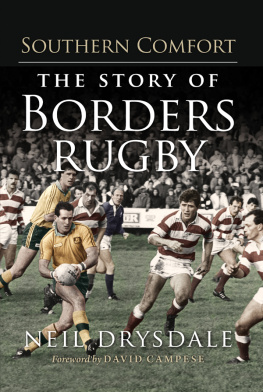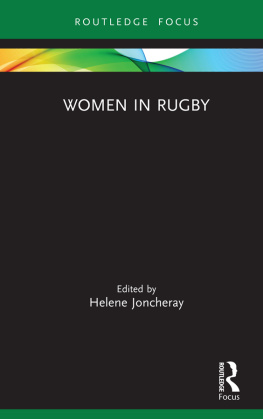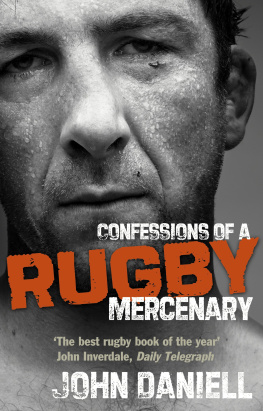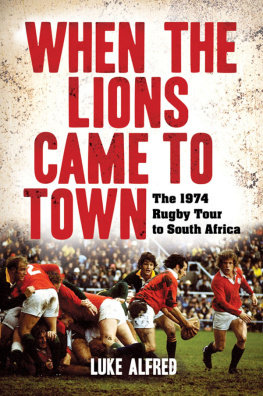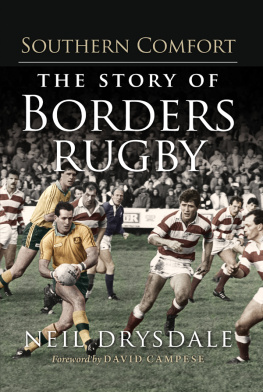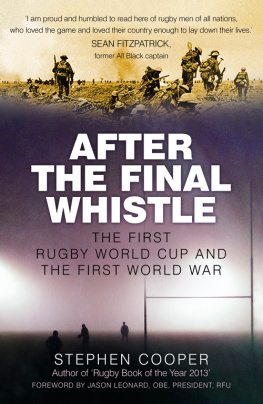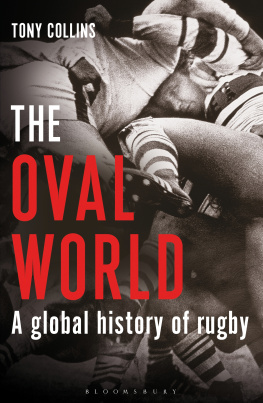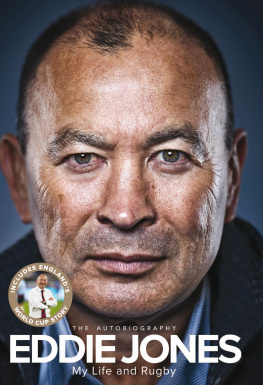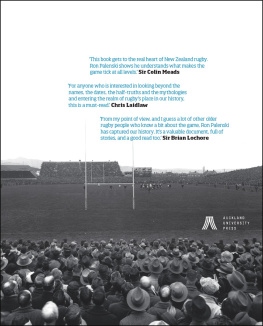S OUTHERN C OMFORT
S OUTHERN C OMFORT
THE HISTORY OF BORDERS RUGBY
NEIL DRYSDALE
BIRLINN
First published in 2011 by
Birlinn Limited
West Newington House
10 Newington Road
Edinburgh
EH9 1QS
www.birlinn.co.uk
In association with the Bill McLaren Foundation
Visit www.billmclarenfoundation.co.uk for more information.
Copyright Neil Drysdale 2011
The moral right of Neil Drysdale to be identified as the author of this work has been asserted by him in accordance with the Copyright, Designs and Patents Act 1988
All rights reserved. No part of this publication may be reproduced, stored or transmitted in any form without the express written permission of the publisher.
ISBN: 978 1 84158 997 8
eBook ISBN: 978 0 85790 097 5
British Library Cataloguing-in-Publication Data A catalogue record for this book is available from the British Library
Typeset by Iolaire Typesetting, Newtonmore Printed and bound by MPG Books Limited, Bodmin
F OREWORD
W HEN I TRAVELLED to Britain in 1984, as part of the Australian team which went on to win the Grand Slam, I already knew that rugby was popular in the Borders, and that Bill McLaren was the voice of the game. But I wasnt aware just how fanatically the sport was followed in the South of Scotland until I had bumped into many, many fans after we had been beaten 96 by the Borderers in Hawick. These supporters didnt just want to bask in their victory; instead, they wanted to talk to us, explore our shared love for rugby, and we chatted for so long that I ended up getting a lift in a police car back to the team hotel at three oclock on the Sunday morning. It was a truly memorable experience.
The following week, in advance of our meeting with Scotland at Murrayfield, our squad was gathered together in a team meeting and, when it finished, this dapper gentleman walked up to me and politely asked if I could provide him with a few details of my career at that stage. He wasnt intrusive, nor did he seem to want any attention focused on himself. Instead, this was the peerless Bill McLaren going about his craft, working tirelessly behind the scenes, researching facts and checking statistics, to make sure that when the time came for him to pick up the microphone, he could make it all sound easy.
Already, as a youngster growing up in Australia, I had grown transfixed by listening to Bill painting pictures of Tests from places I had never visited, and it was fascinating to witness him at close quarters going about his business, quietly, unfussily, but with a genuine interest in the young players to whom he was speaking. I could tell that he must have been a terrific teacher. He was also the commentator who could best convey what was happening on a rugby field and did so without screaming, or trying to whip up arguments and being controversial for the sake of it. The love for and knowledge of rugby were there in the words, the fluency with which he described the action, and that was due to the hours of preparation which Bill had expended on getting it right in advance. He came to see us during our 1988 tour of Britain, and also attended our training sessions in Australia in 1992 before the Scots played us in two Test matches. Bill knew so much about us already, but, in his eyes, there was always something new to discover and that dedication left a positive impression with everybody he met.
For me, and I cant express it any other way, Bill was rugby. Nobody else will ever compare to him. He was a great man, a great mate, and he was Hawick through and through. He and his home town were inseparable and they always will be.
As the years passed, I returned to the Borders on a fairly regular basis and developed an affinity with the obvious passion which existed in that region for everything to do with rugby, and which ensured that they kept producing a string of world-class players, men in the mould of John Rutherford, Roy Laidlaw, Colin Deans and Jim Renwick. Personally, I think we have lost something in the modern era, where touring teams follow a relentless schedule of airport to hotel and training pitch to Test match, then its on to the same routine the next week, and the same the week after that, and that is all the players get to see of the countries they are visiting. In 1984 we had 18 fixtures on our trip to Britain and Ireland and although our main focus was obviously rugby, we also had time to explore the communities and learn about the customs in the different places, as well as forging a connection with the supporters, which for me was very important.
This meant I had the chance to go out and take a look around the various towns and talk to people in the South of Scotland and, whether developing my fondness for Hawick Balls the delicious minty sweets which the ubiquitous Bill used to hand out to friends, colleagues and players on his travels or subsequently participating at the Melrose Sevens, which was one of the great events on the rugby calendar, I gradually started to understand how rugby was close to being a religion in that part of the world.
I was part of the Randwick team which visited Melrose in 1990, along with team-mates such as Glen Ella, John Maxwell and Michael Cheika, the latter of whom now coaches Stade Franais, and it soon became pretty obvious that, while Borders people will extend a warm greeting to visitors, that friendliness stopped as soon as we had walked out on to the pitch. It was a fantastic tournament but it was also a real test of endurance, because you gained so little time to recover between matches, and I can remember the sense of relief when I dived over in the corner to score a try at the end of our match with Melrose, which obviously didnt please the locals or Craig Chalmers too much! That was another aspect of the Borders which fascinated me: the way in which they pulled together and, whether you went to Hawick or Melrose or Galashiels, they all had their own identities and yet could pool their resources together in a bigger cause when it was required.
The upshot has clearly benefited Scottish rugby, and I feel privileged to have known Bill the two of us were inducted into the IRB Hall of Fame in the same year and although many things have changed in the sport, I genuinely believe that the values which Bill cherished, such as the camaraderie which existed between teams, and a sense of adventure and desire to entertain being encouraged by coaches, will not be sacrificed in the pursuit of winning at all costs. So too, I hope that the qualities which have brought so much success to the Borders will continue to thrive in the future. It is a special part of the world and one which rugby enthusiasts everywhere should cherish.
David Campese,
July 2011
I NTRODUCTION
J ONI MITCHELL had it right. Sometimes you dont know what youve got till its gone. Year in, year out, those of us who were born and grew up in the Central Belt used to take it for granted that, while football was the number one sport in Scotland, there would always be a part of our country where a volunteer army of Stakhanovite souls could be relied upon to expend countless hours of energy into developing excellence in rugby union.
That place was the Scottish Borders and their part in the story of the oval ball has been immense. Indeed, without the tireless endeavours of generations of players and coaches, officials and supporters, there would probably have been no Grand Slam in 1984 or 1990, because the contribution of those who emerged from the likes of Melrose and Hawick, Gala and Jed-Forest, Selkirk and Kelso was crucial to the eventual triumphs of Jim Aitken and David Soles teams. And when one casts ones gaze over the litany of world-class performers who have emerged from those little communities in the South where no town has a population of more than 20,000 and examines the influence on the global game of individuals such as Jim Telfer, Derrick Grant, Hugh McLeod, Bill McLaren and Ned Haig, allied to the status of such maestri as John Rutherford, Colin Deans, Gary Armstrong, John Jeffrey, Jim Renwick, Roy Laidlaw, Alan Tait, Keith Robertson, Craig Chalmers, Alan Tomes, Doddie Weir and, continuing into the present day with the most-capped Scot to have played the game, Chris Paterson, it should be evident that those who have been the catalysts for sustained success in Borders rugby, whether in the limelight or toiling assiduously behind the scenes, deserve to have their exploits from the last 140-plus years celebrated with gratitude from the outside world.

